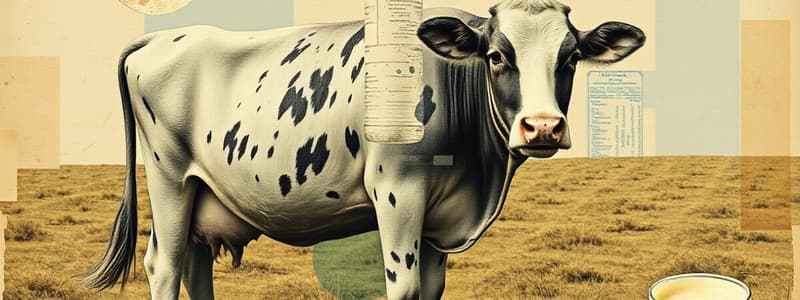Podcast
Questions and Answers
What is Casein?
What is Casein?
- A type of sugar
- A protein found in dairy (correct)
- A type of bacteria
- A cooking method
What is Lactose?
What is Lactose?
- A sugar found in milk (correct)
- A type of fat
- A type of protein
- A type of cheese
What does fortification refer to in dairy?
What does fortification refer to in dairy?
Adding Vitamin D to milk
What is pasteurization?
What is pasteurization?
What is homogenization?
What is homogenization?
What nutrient in dairy products helps build strong bones?
What nutrient in dairy products helps build strong bones?
What type of milk contains the least amount of fat?
What type of milk contains the least amount of fat?
What type of milk contains the most amount of fat?
What type of milk contains the most amount of fat?
What are curds?
What are curds?
What is whey?
What is whey?
What is yogurt?
What is yogurt?
Define fresh cheese.
Define fresh cheese.
What is ripened cheese?
What is ripened cheese?
What does nutritional value refer to in eggs?
What does nutritional value refer to in eggs?
What nutrient are eggs an excellent source of?
What nutrient are eggs an excellent source of?
What is the yolk of an egg?
What is the yolk of an egg?
What happens during scorching?
What happens during scorching?
What is a sell-by date?
What is a sell-by date?
What foodborne illness is caused by eating raw or uncooked eggs?
What foodborne illness is caused by eating raw or uncooked eggs?
What is the binding function of eggs used for?
What is the binding function of eggs used for?
What is an emulsifier?
What is an emulsifier?
What is a leavening agent?
What is a leavening agent?
What is poached egg preparation?
What is poached egg preparation?
What is the most common egg size used in recipes?
What is the most common egg size used in recipes?
What is the principle of dairy and egg cookery?
What is the principle of dairy and egg cookery?
How should eggs be stored?
How should eggs be stored?
Flashcards are hidden until you start studying
Study Notes
Dairy Terms
- Casein: A key protein found in dairy products, important for muscle repair and growth.
- Lactose: The naturally occurring sugar found in milk, which some individuals may be intolerant to.
- Fortification: The process of adding nutrients, such as Vitamin D, to milk to enhance its health benefits.
- Pasteurization: A heat treatment process for milk that kills harmful bacteria and preserves nutritional value.
- Homogenization: A mechanical process that breaks down milk fat globules to ensure uniform distribution in milk.
- Calcium: An essential mineral in dairy that plays a significant role in developing strong bones and teeth.
- Nonfat/Skim Milk: Contains minimal fat, offering a lower calorie option while maintaining nutritional content.
- Whole Milk: Richer in flavor and nutrients compared to skim milk, it contains the highest fat content.
Cheese and Dairy Products
- Curds: Solid masses formed when milk is treated with enzymes, essential for cheese production.
- Whey: The liquid portion that separates from curds during cheese-making, rich in proteins.
- Yogurt: A dairy product created by fermenting milk with beneficial bacteria, known for its tangy flavor and creamy texture.
- Fresh Cheese: Includes varieties like Cottage or Cream Cheese, not subjected to aging.
- Ripened Cheese: Aged varieties that develop complex flavors through bacterial, mold, or yeast action, e.g., Cheddar.
Egg Fundamentals
- Nutritional Value: Eggs universally provide a range of nutrients, regardless of size, grade, or color.
- Protein: Eggs are one of the best sources of high-quality protein, supporting muscle and tissue health.
- Yolk: The yellow part of the egg contains the majority of its saturated fat and cholesterol.
Egg Cooking Techniques
- Scorching: A cooking flaw where milk overheats, causing it to burn and develop a brown color.
- Sell-by Date: Important for determining the freshness and safety of dairy products and eggs during shopping.
- Salmonella: A foodborne disease associated with consuming raw or undercooked eggs and unpasteurized milk, highlighting the need for safe food handling.
- Binding: The role of eggs in recipes, helping to combine and stabilize ingredients in dishes like meatloaf.
- Emulsifier: Eggs assist in blending liquids that usually separate, like the oil and vinegar in mayonnaise.
- Leavening Agent: In baking, eggs provide volume and lightness, helping creations like angel food cake rise.
- Poached: A method of cooking eggs in simmering water, resulting in a tender texture without the need for oil or fat.
- Large: This is the standard egg size commonly used in recipes, providing consistent results.
Cooking and Storage Tips
- Moderate to Low Temperatures: Essential for cooking both dairy and eggs properly to prevent curdling and ensure even cooking.
- Storing Eggs: Best kept in their original carton in the back of the refrigerator to maintain quality and freshness.
Studying That Suits You
Use AI to generate personalized quizzes and flashcards to suit your learning preferences.




